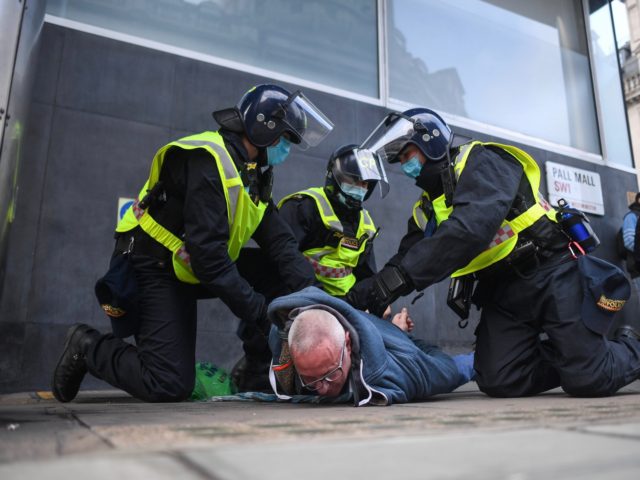One year after draconian lockdown measures were imposed upon the British public, a review from the Crown Prosecution Service (CPS) has shown that all prosecutions brought under the Coronavirus Act have been unlawful.
The Coronavirus Act, which was introduced by the Conservative government in March of last year, saw the most extensive curtailing of liberty in the history of peacetime Britain, with police being empowered to detain “potentially infectious persons” as well as the ability to break up so-called mass gatherings and issue fines up to £10,000.
The latest CPS review of Coronavirus Act prosecutions, which was released on Tuesday — the anniversary of the implementation of the first lockdown in Britain — found that an additional six prosecutions were found to be illegitimate in February.
The latest findings mean that 252 prosecutions under the act have been unlawful, with zero convictions. The review also found that 47 people were wrongly charged under various coronavirus regulations last month, representing nearly one-third of all charges.
Gregor McGill, CPS Director of Legal Services, said: “We remain committed to reviewing all of these cases for as long as necessary to ensure the right people are charged with the right offences.”
The civil liberties campaign group Big Brother Watch said: “The numbers make it plain – these draconian laws are consistently being enforced wrongly.”
On Thursday, MPs in the House of Commons will vote on whether the Coronavirus Act will be extended. Prime Minister Boris Johnson has argued that the government still requires the powers laid out in the legislation, warning of a potential third wave of the virus from the European Union.
Conservative MP and leader of the lockdown sceptical Covid Recovery Group, Mark Harper, said: “The Coronavirus Act contains some of the most draconian detention powers in modern British legal history, and if ministers want to renew its provisions, they must demonstrate they are proportionate, reasonable and grounded in evidence.”
“For any and every temporary measure that the Government wishes to retain, the burden is on them to set out, in Parliament, a very clear justification,” he added.
The extension of coronavirus powers is expected to easily pass a House of Commons vote, however, as the so-called opposition Labour Party has consistently backed the Conservative government in restricting liberties during the pandemic.
The British police have come under criticism for their overzealous enforcement of coronavirus restrictions over the past year, forcefully shutting down anti-lockdown protests and even targetting Britons for merely sitting on park benches.
In a notable example of the lengths to which police have gone attempting to enforce COVID regulations, the Derbyshire Police force was widely condemned after they cracked down on people walking their dogs in the countryside. The police force even used drones to record footage of walkers, which they later posted on social media in order to shame the supposed breaches of the regulations.
The China-style shame campaigns were later picked up by the Greater Manchester Police (GMP), who publicly shamed a man on social media for having a cup of tea at his friend’s house, ultimately fining him £200.
At a December anti-lockdown protest in London, Heritage Party leader and London mayoral candidate David Kurten was confronted by police for speaking with supporters. At the time, Kurten told Breitbart London: “This is the beginning of fascism.”
Follow Kurt Zindulka on Twitter here @KurtZindulka

COMMENTS
Please let us know if you're having issues with commenting.